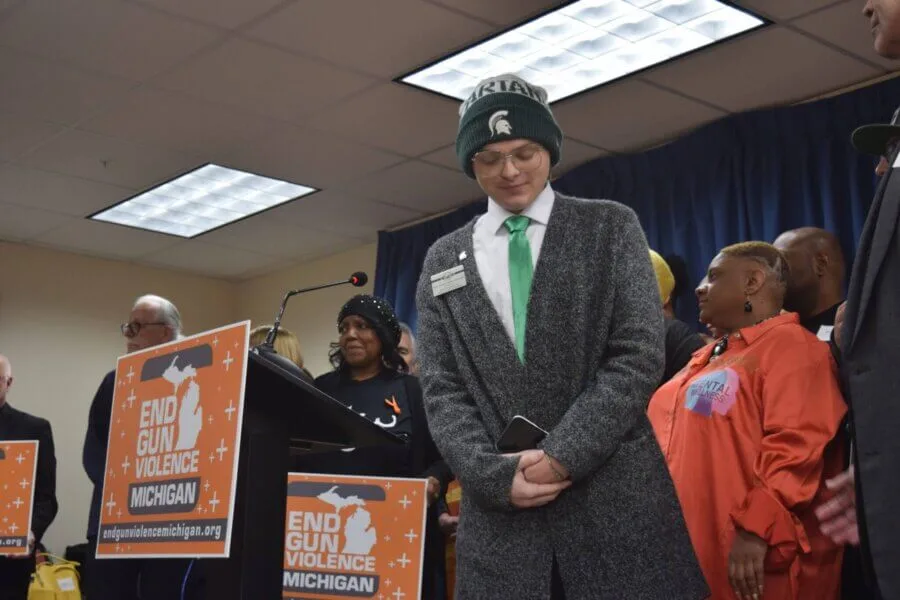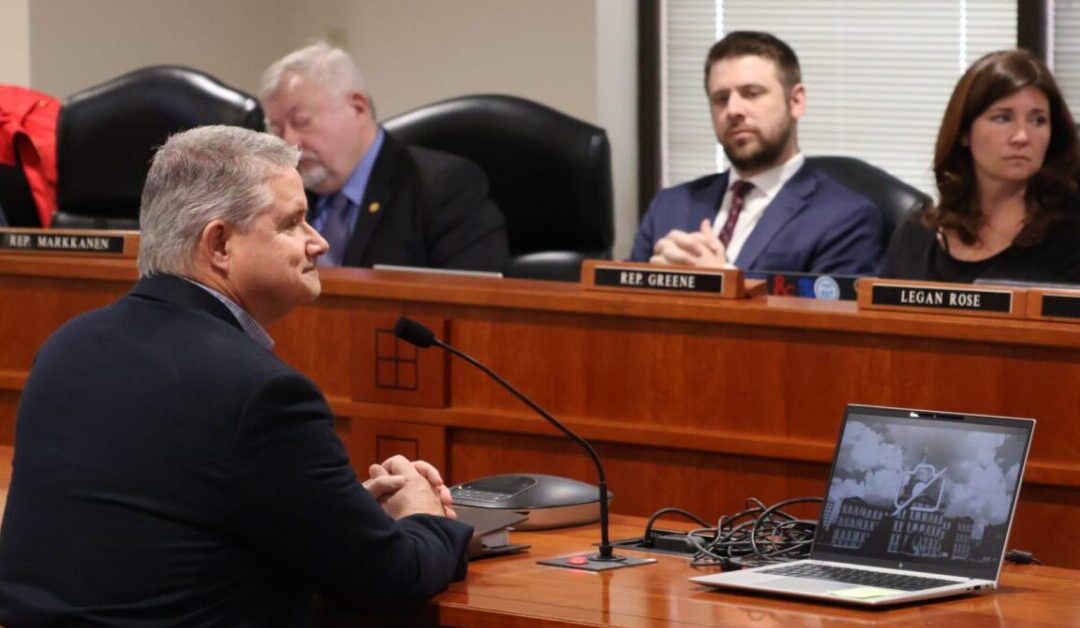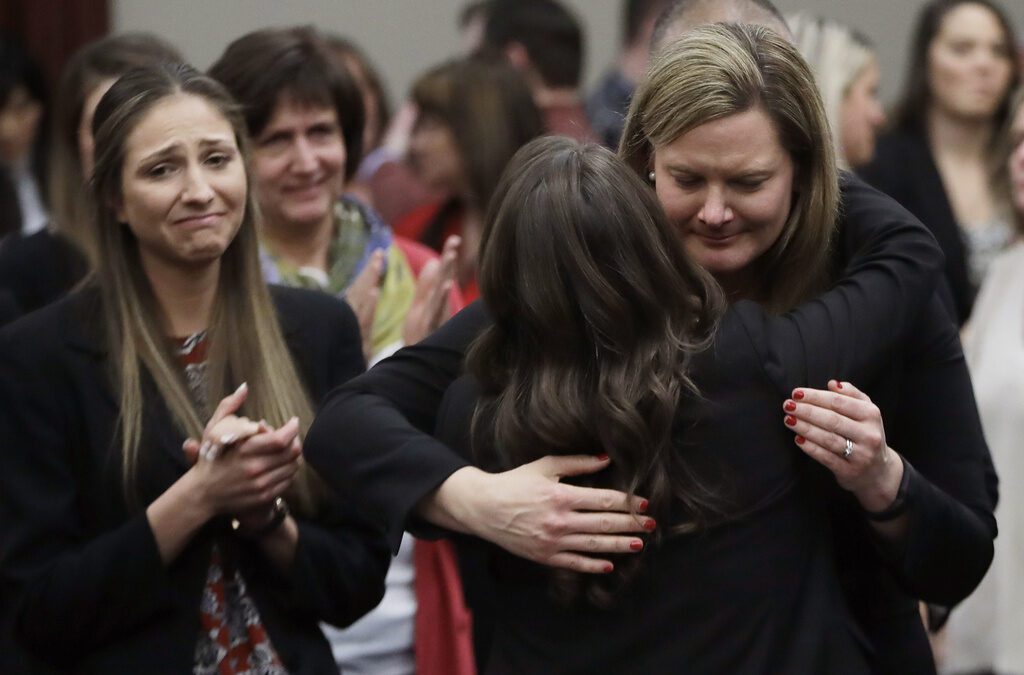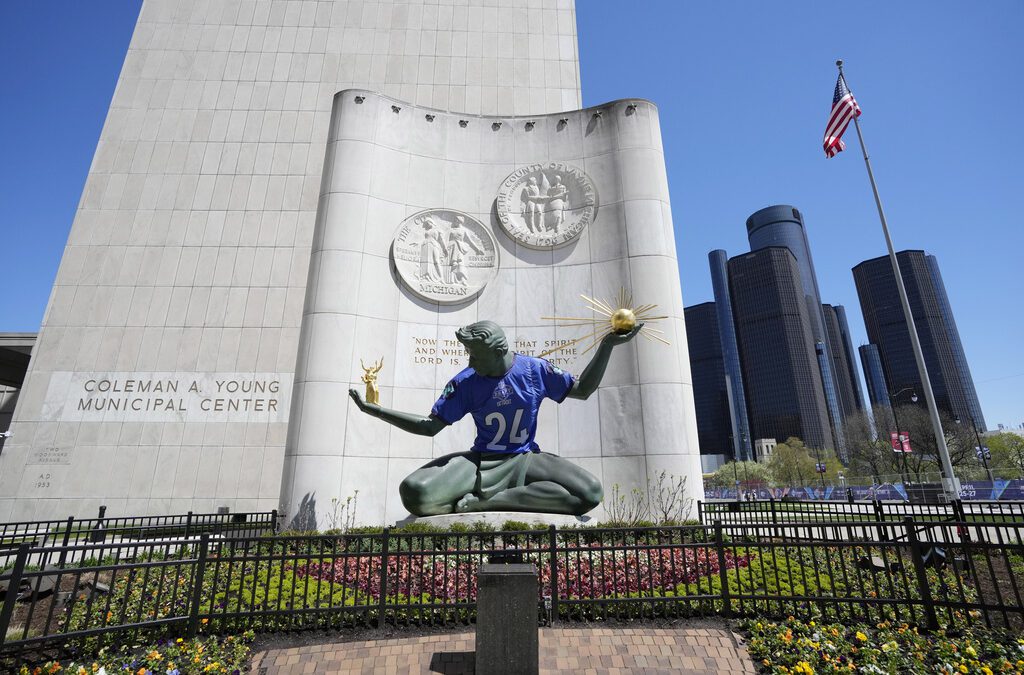
Carl Austin Miller Grondin, a senior at Michigan State University, attends an End Gun Violence press conference on March 1, 2023 in Lansing. (Anna Gustafson/Michigan Advance)
BY ANNA GUSTAFSON, MICHIGAN ADVANCE
MICHIGAN—Under the fluorescent lights of the Anderson House Office Building in downtown Lansing, a crowd gathered Wednesday afternoon.
They wore orange, a color symbolizing gun violence survivors, and clasped hands with one another as people spoke of suicide and students dying and operating on children with gun wounds.
Often, they cried.
For many of those who spoke during the Michigan Legislature’s first hearing on a package of 11 gun reform bills introduced by House Democrats in the wake of the Feb. 13 mass shooting at Michigan State University, the support for the proposed legislation comes from a deep well of pain that reverberated throughout much of the testimony.
“At the end of the day, the questions of how we’re doing and the statements saying how strong we are, people calling us resilient — it’s too much to bear,” Carl Austin Miller Grondin, a senior at MSU, said during the House Judiciary Committee’s hearing on bills 4138–4148.
“I’m so sorry for what we’ve gone through, and that our pain seems like a spectacle for the rest of this nation and that we have to go through all of this under a microscope,” continued Grondin, the MSU student body vice president for internal administration.
The bottom line is, if not now, when? If not you, who is going to do it?
– Former U.S. Rep. Fred Upton (R-St. Joseph)
All 15 people who gave extensive testimony at the packed hearing backed the House Democrats’ bills, which were announced last week but officially read in Feb. 28 after a winter storm delayed their introduction. The House legislation mirrors Senate bills that Democrats introduced the week of the MSU shooting.
The legislation in both the House and the Senate would mandate universal background checks for all guns (currently, only the purchase of handguns requires a background check in Michigan), require that gun owners safely store firearms that could be accessed by minors, and permit a court to order the temporary removal of firearms from someone who may be a danger to themselves or others.
Gov. Gretchen Whitmer, who pushed for these gun reform measures in her State of the State, has said she would sign the bills if the Legislature passes them.
Judiciary Committee Chair Kelly Breen (D-Novi) said the House will hold additional hearings on the bills next week; the dates and locations for those have yet to be announced.
The Senate Civil Rights, Judiciary and Public Safety Committee will hold its first hearing on the gun reform legislation at noon Thursday in Room 1100 in the Binsfeld Office Building in downtown Lansing.
Wednesday’s House hearing comes after years of Republican leadership thwarting Democratic legislators’ attempts to enact gun reform, including after a mass shooting at Oxford High School in November 2021.
Following November’s election, Democrats took control of the House and Senate and maintained control of the governorship — giving them legislative power Democrats haven’t had in 40 years. With their new, however narrow, majorities, Democratic lawmakers have said they expect to pass these gun reforms and hope to push through additional bills meant to curb gun violence in the near future.
The House bills received the backing from a wide variety of individuals and groups on Wednesday, including MSU students; former U.S. Rep. Fred Upton (R-St. Joseph); Dr. Natasha Bagdasarian, Michigan’s chief medical executive; gun violence researchers from the University of Michigan’s Institute for Firearm Injury Prevention; Everytown for Gun Violence, a national gun reform advocacy group; Brady United; and Nicole Hockley, whose 6-year-old son, Dylan, was killed in a mass shooting at Sandy Hook Elementary in 2012. Hockley is now the co-founder and CEO of Sandy Hook Promise, a nonprofit that advocates for gun reform nationwide.
“The bottom line is, if not now, when?” said Upton, who testified via Zoom. “If not you, who is going to do it? How many more [shootings] do we have to endure to make our state safe?
“Your constituents are watching,” Upton continued. “We are not going away. Heaven help us if we have another one [mass shooting] without any action.”

Upton and former U.S. Rep. Dave Trott (R-Commerce Twp.) this week put out a joint statement backing the legislation.
“As strong supporters of the Second Amendment and proud Republicans, we feel it is our duty to come out in support of this legislation,” the said. “Students, educators, and parents in Michigan have suffered through multiple mass shootings in the past fifteen months, and Michiganders deserve action. This common sense gun safety reform will save lives by getting illegal guns off our streets while helping law enforcement protect our families.”
READ MORE: Former GOP Congressmen Join Push for New Gun Reforms in Michigan
Last year, Upton, along with former U.S. Rep. Peter Meijer (R-Grand Rapids) joined Democrats and voted for the most comprehensive federal gun reform legislation in three decades following a May mass shooting that killed 19 students and two educators in Uvalde, Texas.
Those who addressed the Judiciary Committee on Wednesday wove an often emotional narrative around the soaring rates of gun violence in Michigan and the United States—a country where there are more firearms than people and where gun violence has been the leading cause of death for children since 2020.
Keegan Mays-Williams, the midwestern chapter legal counsel for Everytown, told lawmakers that gun homicides and gun suicides in Michigan have increased significantly over the past decade. Between 2012 and 2021, the most recent year for which there is Centers for Disease Control and Prevention data, gun suicides in Michigan rose 26% and firearm homicides increased by 21%.
Patrick Carter, co-director of the Institute for Firearm Injury Prevention at the University of Michigan, noted that there were more than 1,500 gun violence deaths in Michigan in 2021—a 40% increase since 2014. Nationwide, there were about 48,000 deaths from gun violence in 2021, the highest number of deaths the CDC has ever recorded.
These numbers are not inevitable, Bagdasarian and other medical professionals emphasized. When the US implemented measures to address automobile accidents, such as laws requiring seat belts, deaths and injuries dropped. The same kind of approach can be taken with gun violence, doctors said.
“We need to have a public health approach to gun violence,” Bagdasarian said. “Gun violence is preventable. Many of the strategies of public health used to change behaviors related to other issues, such as motor vehicle accidents and tobacco use, can be adapted to address gun violence.”
Inaction, on the other hand, will only lead to more deaths, those testifying during the hearing said.
“We are facing one of the most important public health problems of modern times,” said Dr. Brian Stork, a Michigan State Medical Society board member who practices medicine in Muskegon.
Stork’s work has “put me face to face with the horrific reality of firearm violence,” Stork said. “I’ve had to operate on victims with multi-organ injuries.
“I’ve been part of a community that has been traumatized and continues to be re-traumatized by the daily toll of gun violence that is decimating communities across the state and beyond,” Stork continued.
It is that word—trauma—that was invoked time and again by those who spoke at the hearing. Whether they were MSU students who survived the Feb. 13 mass shooting that killed three students and wounded five others or individuals who have lost loved ones to suicide, those whose lives have been touched by gun violence now live with scars that will never disappear.
Sawyer McClure, an MSU student and president of the MSU Interfraternity Council who read a statement on behalf of a close friend of Brian Fraser, one of the students killed at MSU, said it’s crucial for lawmakers, and people in general, to continue to check in with those impacted by the mass shooting.
“Far too often, mental health conversations in fraternities are limited to a simple phrase: ‘You good, bro?’” McClure said. “The conversation cannot end there. There’s far more that needs to be discussed than a two-second check-in.”
Fraser had served as the chapter president of Phi Delta Theta at Michigan State.
Others voices wavered as they spoke of loved ones who died by gun suicide.
“I wish they hadn’t had access to an incredibly efficient killing machine,” Jon Gold, president of the Michigan chapter of Giffords Gun Owners for Safety and a firearms instructor, said of the three people he has lost to suicide in the last several years.
“If the legislation we’re discussing today had been enacted a few years ago, my loved ones might be alive today,” Gold said.
If the legislation we’re discussing today had been enacted a few years ago, my loved ones might be alive today.
– Jon Gold, president of the Michigan chapter of Giffords Gun Owners for Safety and a firearms instructor
During the hearing, Democratic lawmakers vowed action—and issued apologies to gun violence survivors.
“So many folks owe so many of you, all of you, our apologies for delay, for lack of safety, for the fact that you still have so much good to do and so much to learn in a place where you don’t feel safe,” Rep. Emily Dievendorf (D-Lansing) said following the MSU students’ testimony. “Where you’ve learned, for right this second, you aren’t safe.
“We are done sacrificing your lives for us to learn how important this is,” Dievendorf continued. “And I’m sorry. I’m sorry, and we are sorry that you feel you have to be here for us to see and know how important this is.”
No one testified against the gun reform bills at Wednesday’s hearing. However, Great Lakes Gun Rights, a pro-gun group, has already mounted a campaign against gun reform legislation and vowed to launch recall campaigns against any lawmaker who votes for them.
The only Republican lawmaker to make a comment during the meeting was Rep. Pat Outman (R-Six Lakes), who questioned whether gun reform would lead to additional government oversight in other areas.
“I just don’t know where this ends,” Outman said.
Breen ended the hearing by telling the crowd that, “We are going to do something.”

A Day of Support
Prior to Wednesday’s hearing, gun reform advocates held events online and in Lansing to rally support for the legislation.
End Gun Violence Michigan, a coalition of organizations working for gun reform across the state, held a Wednesday afternoon press conference in the Anderson House Office Building with faith leaders and Grondin, the MSU student who spoke during the legislative hearing.
“We have made ending gun violence in our state a pastoral priority,” Bishop Bonnie Perry of the Episcopal Diocese of Michigan said of herself and other Episcopal bishops in the state. “We’ve made it a pastoral priority because it is the number one cause of death for our children in our state and in our country. And we long for a world where our children can go to school free of fear. We long for a state where our young people can enter a classroom and not be wondering where they might have to hide in the event of a shooter.
“We’ve made it a pastoral priority because suicide rates in the rural parts of our state are at levels we have never seen before,” continued Perry, a founding member of End Gun Violence Michigan.
Rev. Dale Milford of the Hope United Methodist Church in Southfield criticized the response of solely focusing on “thoughts and prayers” to gun violence.
“How many times have you heard that—that ‘our thoughts and prayers?’” Milford asked. “Now, don’t get me wrong, as a faith leader, I am here to profess that prayers are an essential part of our response. But prayers are just the start of the process. They are not the end. So the political action of this movement that we’re surrounded by today, that’s over the years changed the climate in Lansing to one where I believe that, even today, sensible gun violence laws are possible.”
It is not until lawmakers pass these laws that students will feel as though they can exhale, at least somewhat, once again, Grondin said.
“This happened to our home when it could have been prevented,” Grondin said of the mass shooting at MSU. “While our community grieves, we will not stop until no other student has to endure the nightmare of another school shooting.”
For a Detroit pastor who has been working on gun violence reform for a decade and a half, gun violence has left him attending what often feels like a never-ending stream of funerals for people whose faces never make their way into the media.
Pastor Barry Randolph of Detroit’s Church of the Messiah said he began organizing around gun reform because he “was shocked, absolutely shocked when I first became a priest how many children I had to bury.”
“I want to make sure that no one forgets the students who lost their lives at MSU and Oxford,” Randolph said. “I also want to make sure that we don’t forget about the lives lost in inner-city Detroit.”
‘Should Have Been Done Years Ago’
In the hours leading up to the House hearing, Everytown hosted a press call with Lt. Gov. Garlin Gilchrist, Senate Majority Leader Winnie Brinks (D-Grand Rapids), House Speaker Joe Tate (D-Detroit), MSU student Saylor Reinders and Angela Ferrell-Zabala, the senior vice president for movement building at Everytown for Gun Safety and Moms Demand Action.
Each of the elected officials said they expect the legislation to soon come to a floor vote, and Brinks said the bills will have full Democratic support as well a few Republicans backing them.
“It is unacceptable for us now to not do anything, and we’ve seen that in past legislative sessions where we have brought forth common sense gun violence prevention bills to protect families, to protect students, and all Michigan residents, and the inaction that has been taken over the past several years is no longer acceptable,” Tate said.
The reforms currently before the House and Senate “should have been done years ago,” the House speaker continued.
Both Brinks and Tate noted that the current legislation moving through the House and Senate is the beginning of what they would like to be further action around gun reform.
“This is certainly the floor and not the ceiling,” Tate said.
I’m so sorry for what we’ve gone through, and that our pain seems like a spectacle for the rest of this nation and that we have to go through all of this under a microscope.
– Carl Austin Miller Grondin, a senior at MSU
Brinks said lawmakers are “certainly open to additional legislation.
“We know there are lots of ideas out there,” Brinks continued. “We have a core group of bills right now in front of us that we know that we can move and that can make a concrete difference in people’s lives. So we’re going to start here, but this is a comprehensive conversation.”
Reinders said the passage of the current bills will help students as they navigate their ongoing trauma following the MSU shooting.
“Gun violence is tearing our communities apart, and the majority of Michiganders support stronger gun laws,” Reinders said.
“These are common sense, popular policies that will save lives by keeping guns out of the hands of people who shouldn’t have them,” Reinders continued. “There’s nothing controversial about that.”
National polls routinely show 80% to 90% of the general public, including the overwhelming majority of gun owners, want expanded background checks.
A statewide survey conducted late last year by the Chicago-based Glengariff Group reported that 90% of the 600 participants would support requiring background checks for gun purchases. In the same survey, 74% reported backing the so-called “red flag” laws, which permit a court to remove guns from individuals deemed as a threat to themselves or others.

Banning Guns at Polling Places
Democratic lawmakers are also pushing legislation, House Bills 4127 and 4128, that would ban firearms within 100 feet of polling places, ballot drop boxes and early voting locations.
The House Elections Committee held a hearing on those bills Tuesday.
“I am grateful for the work done today by the members of the House Elections Committee who held a meaningful discussion about the need to keep voters and poll workers safe by prohibiting firearms at polling places when people are voting,” Secretary of State Jocelyn Benson said of the hearing. “Thank you for your work to protect Michigan’s election workers and voters.”
As with the other gun reform bills, Democrats introduced similar legislation during the last legislative session but those bills languished in committee under Republican leadership. Benson too has long advocated to ban guns from polling places. In 2020, Benson issued an order to ban open carry at polling places. A judge struck down that ban.
Another recently introduced bill, House Bill 4129, would make it a felony to intimidate an election official or worker. That has been referred to the House Elections Committee.
This coverage was republished from Michigan Advance pursuant to a Creative Commons license.
Politics

Investigator says Trump, allies were uncharged co-conspirators in plot to overturn Michigan election
DETROIT—A state investigator testified Wednesday that he considers former President Donald Trump and his White House chief of staff to be uncharged...

Michigan Dems introduce ‘Child Care for All’ legislation to lower costs for families
Lawmakers say Michigan is facing a ‘child care crisis.’ But a series of bills introduced this month would help to make child care (much) more...

Families of mass shooting victims and survivors call for education on new safe storage laws
BY KYLE DAVIDSON, MICHIGAN ADVANCE MICHIGAN—Parents of victims and survivors of the Oxford High School and Michigan State University shootings on...
Local News

US government agrees to $138.7M settlement over FBI’s botching of Larry Nassar assault allegations
DETROIT—The US Justice Department announced a $138.7 million settlement Tuesday with more than 100 people who accused the FBI of grossly mishandling...

NFL draft has been on tour for a decade and the next stop is Detroit, giving it a shot in spotlight
DETROIT—The NFL draft has taken the show on the road for a decade, giving cities around the country a chance to be in the spotlight. Detroit is on...





